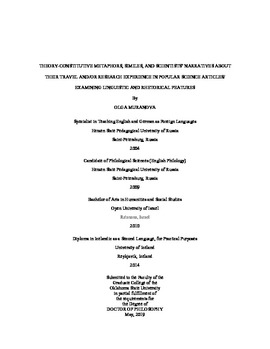| dc.contributor.advisor | Halleck, Gene | |
| dc.contributor.author | Muranova, Olga | |
| dc.date.accessioned | 2019-10-25T19:51:40Z | |
| dc.date.available | 2019-10-25T19:51:40Z | |
| dc.date.issued | 2019-05-01 | |
| dc.identifier.uri | https://hdl.handle.net/11244/321561 | |
| dc.description.abstract | Among popular science publications, the most common type is the Popular Science Article (PSA). The main purpose of PSAs is to convey the necessary scientific content in the form accessible to non-specialists. They also contain the authors' personal evaluations, opinions and interpretations of the things related to their subject. This dissertation project is aimed at investigating the use of theory-constitutive metaphors, similes and scientists' narratives about their travel/research experience in the text of PSAs magazines intended for different categories of non-specialist audiences. Its results show that introducing these linguistic and rhetorical devices into the texts of PSAs may help their authors make communication between specialists and lay readers more effective. For example, the use of metaphors and similes which serve to link an unknown phenomenon or concept to a more familiar one by comparing them allows the authors of PSAs to make complex concepts graspable, simple, and thus comprehensible for the general public. At the same time, including the narratives about scientists' travel and/or research experience in the texts of PSAs allows their authors to balance their dual goals of reporting objective and accurate factual and scientific information, on the one hand, and conveying the researchers' and the authors' personal evaluations and opinions, on the other hand. Including additional clues (evaluative adjectives, lexical intensifiers and mitigating devices, etc.) in the similes and narratives employed in PSAs enable their authors to convey the necessary scientific content in a vivid and engaging way. It also follows from the findings that the use of these devices in the text of PSAs is characterized by certain common and varying features. This refers to the frequency and ways of using theory-constitutive metaphor and simile in the text of PSAs as well as the communicative and pragmatic purposes of scientists' narratives about their travel/research experience. Variations observed in the use of the above-mentioned linguistic and rhetorical means point to the fact that the subject of the articles, their target audience and specific purposes of the magazine where they are published need to be regarded as the contextual factors affecting their use in the text of PSAs. | |
| dc.format | application/pdf | |
| dc.language | en_US | |
| dc.rights | Copyright is held by the author who has granted the Oklahoma State University Library the non-exclusive right to share this material in its institutional repository. Contact Digital Library Services at lib-dls@okstate.edu or 405-744-9161 for the permission policy on the use, reproduction or distribution of this material. | |
| dc.title | Theory-Constitutive Metaphors, Similes, and Scientists' Narratives About Their Travel and/or Research Experience in Popular Science Articles: Examining Linguistic and Rhetorical Features | |
| dc.contributor.committeeMember | Link, Stephanie | |
| dc.contributor.committeeMember | Cheng, An | |
| dc.contributor.committeeMember | Kennison, Shelia | |
| osu.filename | Muranova_okstate_0664D_16204.pdf | |
| osu.accesstype | Open Access | |
| dc.type.genre | Dissertation | |
| dc.type.material | Text | |
| dc.subject.keywords | magazine | |
| dc.subject.keywords | metaphor | |
| dc.subject.keywords | narrative | |
| dc.subject.keywords | popular science article | |
| dc.subject.keywords | science communication | |
| dc.subject.keywords | simile | |
| thesis.degree.discipline | English | |
| thesis.degree.grantor | Oklahoma State University | |
